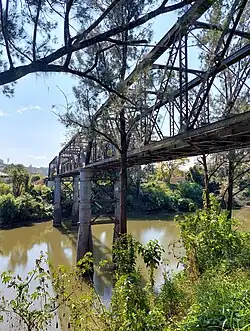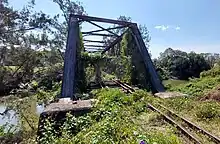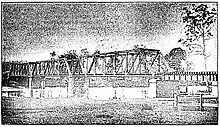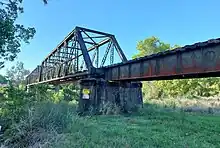Leycester Creek railway bridge | |
|---|---|
 Leycester Creek railway bridge over Leycester Creek, 2023 (view from Union St. end) | |
| Coordinates | 28°48′18″S 153°16′22″E / 28.805075°S 153.272723°E |
| Carries | Murwillumbah railway line |
| Crosses | |
| Locale | Lismore, City of Lismore, New South Wales, Australia |
| Owner | Transport Asset Holding Entity |
| Followed by | Colemans Bridge |
| Characteristics | |
| Design | Truss bridge |
| Material | Steel |
| Pier construction | Timber |
| Longest span | 5.2 metres (17 ft) |
| No. of spans | 3 |
| Rail characteristics | |
| Track gauge | 4 ft 8+1⁄2 in (1,435 mm) standard gauge |
| History | |
| Constructed by | Crosbie, Marquand and Co. |
| Construction start | 1891 |
| Construction end | October 1892 |
| Construction cost | A£22,110[lower-alpha 1] |
| Opened | May 1894 |
| Official name | Lismore railway underbridges |
| Type | State heritage (built) |
| Designated | 2 April 1999 |
| Reference no. | 1044 |
| Type | Railway Bridge |
| Category | Transport – Rail |
| Location | |
Leycester Creek railway bridge is a heritage-listed railway bridge that carries the closed Murwillumbah railway line across Leycester Creek in Lismore, in the City of Lismore local government area of New South Wales, Australia. The bridge is owned by Transport Asset Holding Entity, an agency of the Government of New South Wales and was added to the New South Wales State Heritage Register on 2 April 1999.[2]
History
The bridge was built by contractors Crosbie, Marquand and Co.[3] The contract included both the Leycester Creek and Wilson's Creek bridges, the contractors accepting A£20,708 to build the two bridges, later increased to A£22,110.[1][4] Construction suffered various delays, such as damaged and broken iron cylinders, but was finally completed in October 1892.[5][6][7] It was claimed at the bridge's completion that it was the first steel bridge in the country.[8] The railway over the bridge opened in May 1894.[4]
The bridge has been disused since the closure of the Murwillumbah railway line in 2004.[9]
Description
The bridge consists of a steel three-span truss, with one 3.7-metre (12 ft), one 4.9-metre (16 ft) and one 5.2-metre (17 ft) spans.[2]
According to the Narrabri to North Star Phase 2 Moree to Camurra North Statement of Heritage Impact, "The Leycester Creek Underbridge at Lismore is a good, intact and representative example of a steel Pratt truss underbridge, one of five built at the inception of the Lismore to Murwillumbah railway line in 1894, and an early example of the introduction of American bridge technology by the NSW Government."[10]



In 2018, the "Daily Telegraph" reported that according to an assessment it had seen, it would cost in the order of a million (Australian) dollars to bring the bridge up to a satisfactory condition for any possible re-opening.[11]
Heritage listing
This bridge is part of a group named "Lismore railway underbridges" that is included on the NSW State Heritage Register, as item 01044. That listing states: "The Lismore bridges and viaducts are a fine set of bridges all in one location demonstrating the problems of building railways in this flood prone area dating from 1892."[2]
Lismore railway underbridges was listed on the New South Wales State Heritage Register on 2 April 1999 having satisfied the following criteria.[2]
The place possesses uncommon, rare or endangered aspects of the cultural or natural history of New South Wales.
This item is assessed as historically rare. This item is assessed as scientifically rare. This item is assessed as arch. rare. This item is assessed as socially rare.[2]
See also
- Historic bridges of New South Wales
- List of railway bridges in New South Wales
- Colemans Bridge over Leycester Creek
Notes
References
- 1 2 "The Banquet". The Richmond River Herald And Northern Districts Advertiser. Vol. 5, no. 246. New South Wales, Australia. 27 March 1891. p. 8. Retrieved 20 July 2018 – via National Library of Australia.
- 1 2 3 4 5 "Lismore railway underbridges". New South Wales State Heritage Register. Department of Planning & Environment. H01044. Retrieved 2 June 2018.
 Text is licensed by State of New South Wales (Department of Planning and Environment) under CC-BY 4.0 licence.
Text is licensed by State of New South Wales (Department of Planning and Environment) under CC-BY 4.0 licence. - ↑ "GOVERNMENT GAZETTE". The Sydney Morning Herald. No. 16, 531. New South Wales, Australia. 18 March 1891. p. 5. Retrieved 20 July 2018 – via National Library of Australia.
- 1 2 "THE LISMORE-TWEED RAILWAY". The Sydney Morning Herald. No. 17, 521. New South Wales, Australia. 16 May 1894. p. 5. Retrieved 20 July 2018 – via National Library of Australia.
- ↑ "Lismore". The Sydney Mail and New South Wales Advertiser. Vol. LII, no. 1626. New South Wales, Australia. 5 September 1891. p. 552. Retrieved 20 July 2018 – via National Library of Australia.
- ↑ "The Northern Star". The Northern Star. Vol. 17. New South Wales, Australia. 6 July 1892. p. 2. Retrieved 20 July 2018 – via National Library of Australia.
- ↑ "LATEST TELEGRAPHIC". Clarence And Richmond Examiner. New South Wales, Australia. 1 October 1892. p. 5. Retrieved 20 July 2018 – via National Library of Australia.
- ↑ "Lismore". Australian Town and Country Journal. Vol. XLV, no. 1189. New South Wales, Australia. 29 October 1892. p. 14. Retrieved 20 July 2018 – via National Library of Australia.
- ↑ "Last train: The day our rail service fell silent". Northern Star. 16 March 2017. Retrieved 20 July 2018.
- ↑ Narrabri to North Star Phase 2 Moree to Camurra North Statement of Heritage Impact, Report by Artefact Heritage, March 2022
- ↑ "The 'invisible' bridge that will cost $1 million to fix". www.dailytelegraph.com.au. Retrieved 8 September 2023. (subscription required)
Attribution
![]() This Wikipedia article was originally based on Lismore railway underbridges, entry number 01044 in the New South Wales State Heritage Register published by the State of New South Wales (Department of Planning and Environment) 2018 under CC-BY 4.0 licence, accessed on 2 June 2018.
This Wikipedia article was originally based on Lismore railway underbridges, entry number 01044 in the New South Wales State Heritage Register published by the State of New South Wales (Department of Planning and Environment) 2018 under CC-BY 4.0 licence, accessed on 2 June 2018.
External links
- Google Maps street views of the Leycester Creek bridge (view from Crane Street, North Lismore)
- Drone aerial footage of the bridge, taken in 2017
![]() Media related to Leycester Creek railway bridge, Lismore at Wikimedia Commons
Media related to Leycester Creek railway bridge, Lismore at Wikimedia Commons
